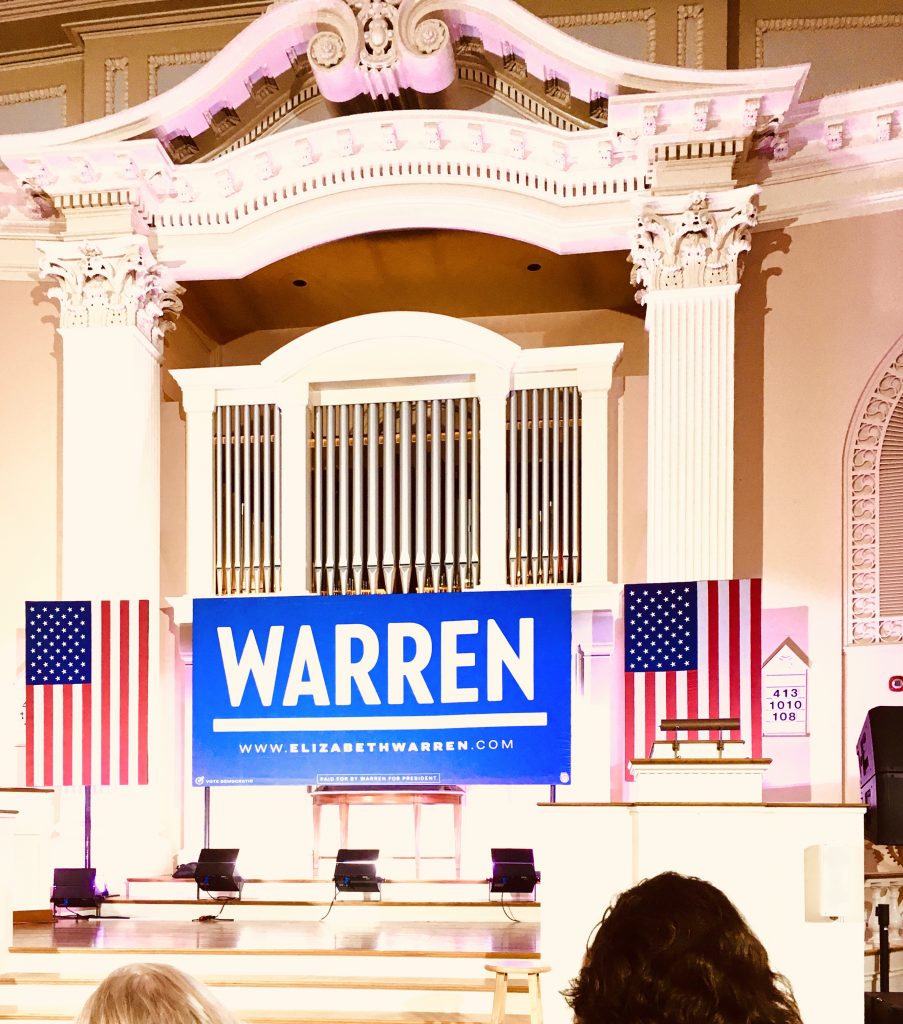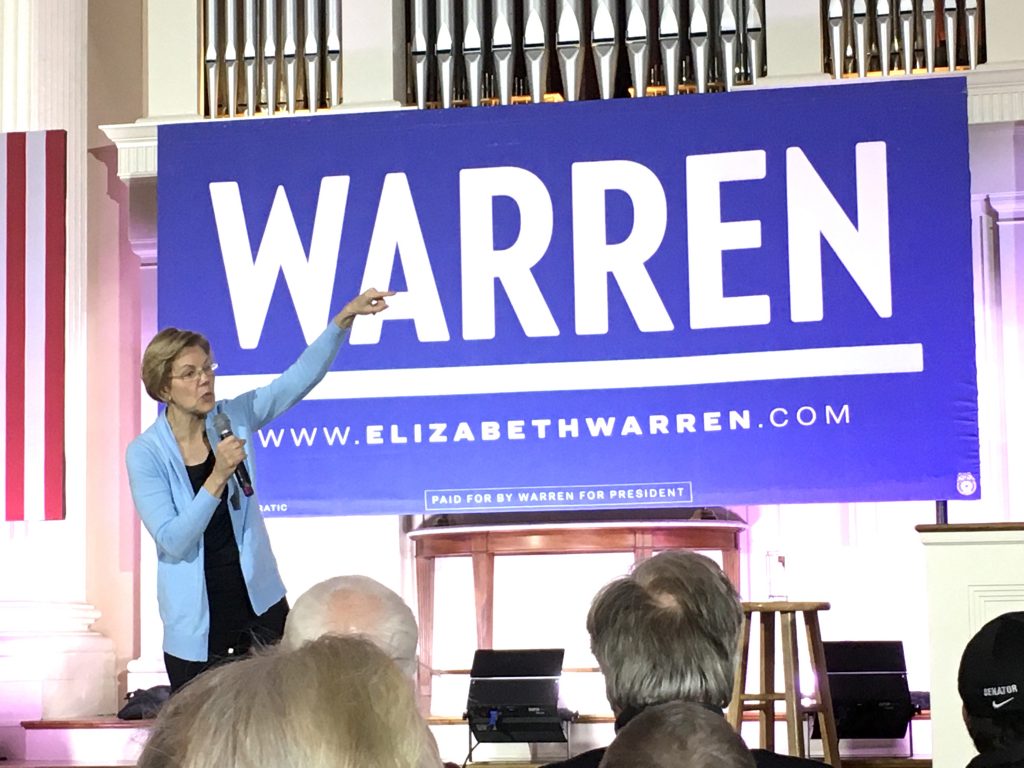It’s Monday, February 10th. One day before the primary. One more day to reach the voters, shake the hands, snap the pictures, wave the signs. The end is nigh. For me, one more drive to make, to join a crowd of people who fall mostly into two camps: devoted followers coming to cheer, or undecideds coming to judge. One more candidate. Today I’ll see Elizabeth Warren up close; I’m still not sure what makes her tick.
First, however, lunch. I walk down to the Red Arrow for lunch. There is a line stretching slightly out the door. There’s a Manchester cop helpfully directing people in and out, keeping them from blocking the doorway. Sirius XM Radio has commandeered one corner of the small place from which to broadcast – the front windows are covered with a big Sirius sign advertising the fact – so the scanty seating has been further reduced. Still, things move pretty quickly for someone just needing one seat, and soon I’m on a stool at the counter.
A group to my left finishes and leaves, and a group of four young men who’d been waiting some time sit down. I listen idly to their talk as I await my turkey club sandwich. Have I mentioned that this is the only diner I’ve been to where, ordering a turkey club, you are asked if you’d like white meat, dark meat or a mixture? Makes all the difference, to some of us. I get a mixture.
I hear a familiar phrase and turn to my left. Did one of these boys say ‘Mamaroneck’? Yes, serendipity has struck again. These four are part of the Mamaroneck High School contingent visiting the primary for a few days to soak up democracy in action. Their teacher, who runs the program, is Mr. Liberti; I believe the class is AP History. (In my 2016 sojourn here I’d actually dropped in on Mr. Liberti and his group at a neighboring motel, hoping to exchange stories or interview some kids, but I must say the teachers were less than wildly welcoming. No worries; I can understand that when chaperoning a large group of kids, it’s highly inconvenient to entertain visitors.)
So here are four who have temporarily spun off from the group to visit the famous Red Arrow. They advise they were given leave for the moment to do that. We talk a bit about what’s on the agenda. They are going to visit a news operation – CBS I think – and I am headed to Portsmouth for a Warren rally. All are MHS seniors and feel lucky their senior year coincides with the presidential primary. They consent to my naming them: they are Mohamed Flitti, Zisis Zias, Iain McLaren, and Andrew Basta (I apologize if I’ve got spellings wrong). As they admit to the waitress that they are first-time visitors to the Arrow, they get the traditional bell-ringing, hand-clapping treatment by the place, and get stickers saying they have been ‘de-virginized,’ all in good fun. This diner really is a little community – enough regulars to provide continuity and play off all the visitors from wherever.
I’m amused that the boys readily agree to try some cream pies – half slices each so they can each try two – before they get into their burgers and such. Ah, youth.
Late afternoon I drive to Portsmouth and find the South Church, and duly take my place in the queue outside. We will wait about 45 minutes for the doors to open, and no one is complaining. The two young women in line behind me are going to college in Massachusetts but are more connected to California – they will vote there. They attend the Olin College of Engineering and I can tell they are refreshingly smart, despite the occasional phrasings that make today’s college women sound to my ears like complete ditzes (“We are actually going to see her! This is so cool!”) A Warren volunteer comes along, signing in everyone (via a phone text; he shows me how to do it) and asking for poll workers for tomorrow. We all make our excuses without guilt because we don’t live here. The volunteer asks if we have any questions for him, and one of the girls asks “So… why Warren?” which is as succinct a call for justification as I’ve heard all week. For a moment it takes the worker aback. Then he says “I really like her policies,” or words to that effect, but he doesn’t specify any, or why.
We all get inside (or almost all; I learn later about 150 people are overflow and are sent to the basement to watch the event via closed circuit tv). The church looks from outside like an old, slightly decrepit survivor, all dark brown weathered stone and no ornamentation. Inside, it is dazzling, a majestic space that looks freshly painted in wondrous tones of pink, beige, peach. A grand proscenium up front, but no crosses or altar. It’s a Unitarian church, which I think is a house of moral uplift and organizer of public philanthropy for almost-atheists. The stage, or whatever, is set with a big Warren banner flanked by American flags.

The crowd, about 400 in the sanctuary, gets to hear an intro from a former Speaker of the New Hampshire state senate, who praises Warren as a fighter.
Warren enters to a standing ovation. She gets a big cheer by asking, “Isn’t it time for a president who likes dogs?” In fact, Warren’s dog Bailey is here – a lovely golden retriever, handled by Warren’s son. Warren tells us that later we can take selfies with Bailey, who is very good at that.
She recounts that she is used to winning unwinnable fights. She wanted to be a public school teacher since second grade. (I expect the “public” is a later political addition to the little girl’s original dream.) Her parents, “a janitor and a minimum-wage worker at Sears” did not view college as within reach for any of the family, but Elizabeth found schools that might give scholarships for debating (“I don’t do sports. Or music”) and used her baby-sitting money for the application fee. Eventually she made it to her “dream job” as a special education teacher.
The transition from that to financial regulation and later, government positions is unclear to me, and not addressed in the speech. But she gets a big hand as always with the story of Mitch McConnell’s remark “Nevertheless, she persisted.”
The country has deep problems, she says. It works better and better for a small group at the top, not for the rest. It works great for giant drug companies, for private detention centers near our borders, for oil companies but not those of us worried about climate change.

The speech is heavily slogans and imperatives. “We can’t nibble — it’s gonna take some big structural changes.” Some of it, to me, doesn’t quite parse: “When the system works for a few and not everybody else, that is corruption pure and simple.” No, I don’t think so. Corruption needs an element of self-profit, I think. Not that we don’t have that too. But what she describes might just be unregulated capitalism. I hope she doesn’t consider them synonymous.
She takes questions from the audience, but with a different method: people who want to ask questions get little lottery tickets, and Warren’s introducer pulled five numbers out of a bucket – those with the winning tickets get to ask their questions. It’s democratic and random, but it’s less spontaneous. And it lets everybody know in advance that she will be taking only five questions; no hopeful hands will go up.
Q1 concerned the boycott of Israel, and Democratic candidates’ failure to censure a congressperson from Michigan who is anti-Israel. Warren answers that ‘We – they all – are looking for peace. Peace for Israel and self-determination and dignity for Palestinians.’ We must encourage them to negotiate for a lasting peace. Trump is too close to Benjamin Netanyahu, has moved him in directions ‘not conducive to peace.’ We should not have a thumb on the scale. Warren says ‘I don’t support the boycott, but I don’t support anti-boycott legislation as I believe it infringes the First Amendment.’ (No mention of Congresswoman Tlaib.)
Q2 asks about student loan debt and especially relief for the parents who (also) assume such debt. Warrren says parents are included in her student loan bill package.
Q3 is about personal family leave, for part-time employees and people who own their own businesses. Warren says she asked Kirsten Gillibrand if she could take her plan after Gillibrand dropped out, and she’s adopted it. Likewise, she added Kamala Harris’s reproductive rights plan to her own platform. Look on her website for family leave provisions. (To me, it’s a factually correct answer, but unsatisfactory for a town hall setting.)
Q4 Asks for Warren’s plan to end Wall Street corruption and eliminate or deal with household debt that is in private hands. Warren says we need regulators who believe they serve interests of the customers, not the banks. Protect the consumer. “It’s time to admit trickle-down economics just doesn’t work.” For 40 years, GDP and the stock markets have gone up, but all that wealth has been soaked up to the top. Wages have been flat, adjusted for inflation. And the cost of housing, healthcare, education is all through the roof. So families build up debt. “It’s time for a wealth tax in America – 2% on wealth over $50 million; 3% on wealth over [some higher figure: $1 billion?]. She says, “It’s a property tax, but not just on the house, it’s on the diamonds, the Rembrandt and the yacht.” Because ‘when you made it big, you used people we all paid in part to educate; used roads and bridges we all paid for; police and fire we all paid for. So when you make it really big, chip in two cents of each dollar.” This gets a standing ovation.
Now, for me, it’s been a productive campaign event: I detest Donald Trump as president and am willing to bend a lot of political positions to see him out of office, but Warren has confirmed she is a bridge too far for me. Several bridges, yachts, and Rembrandts too far. Not that I have any of those things. But I evidently see the country oppositely from her. I am unwilling to put America in the hands of Elizabeth or, for that matter, Bernie. (Bernie at least is lovable.)
Q5 asks how to fix a system where the popular vote is overturned by the Electoral College. Warren answers “I want to get rid of the Electoral College.” And more: We need a constitutional amendment to protect the right of every citizen to vote and to count that vote. And a law to outlaw political gerrymandering. And we need to overturn Citizens United. “This is no time for small ideas. This is the time for Big Structural Change.” The crowd is on its feet again, screaming approval.
Well, that clinches it. I may be the last remaining person in the country who likes the Electoral College, which forces candidates to win states, not just people. Racking up 90% of the vote in California and New York (or Texas and Florida) isn’t enough, and shouldn’t be. And don’t get me started on Citizens United.
Afterwards, as is her tradition, Warren poses for selfies with all who want to. It takes a while, even though her staff by now are a well-oiled machine moving the people through. I question the political value of it – her time could be better spent squeezing in an extra appearance each day. A photo with her hardly cements anyone’s vote; it’s just a souvenir. Take me, for instance:

As I drive back in darkness to Manchester I am reminded that a ‘huge’ Trump rally is about to take place there. In fact, as I drove east to Portsmouth for the Warren event, I saw – on the other side of the divided highway – a convoy of police cars, blue lights flashing, followed by a large bus labeled TRUMP – PENCE. Then more police cars; even some parked on the overpasses, keeping watch.
Sen. Warren was right about one thing: she said “They’ve got lots of money and power, but we have our voices and votes.” Amen to that. She also said “And there are a lot more of us.” That’s the real question for tomorrow, isn’t it? First, who has more, among this gaggle of Democrats? And then second, in November… but first things first. Because the answer to the second will depend in large part upon who wins the first.
